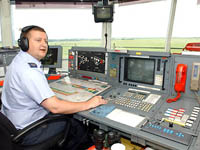Some male air traffic controllers wearing dresses to work to protest dress code in US
Air traffic controllers locked in a staffing dispute with the government are upset about a dress code and have shown their displeasure in high-flying fashion, with some men protesting by wearing women's clothing.

The Federal Aviation Administration's dress code, instituted in September, bars jogging outfits, halter tops, shorts and jeans. Approved clothing items include dress slacks, casual shirts with collars and sweaters. Midnight-shift workers are exempt.
"From our point of view, not a big deal," FAA spokesman Tony Molinaro said.
But a few times in the past year, male controllers have worn dresses or kilts to work, according to the controllers' union, the 15,000-member National Air Traffic Controllers Association. The point was to illustrate the silliness of the dress code because nothing bars male controllers from wearing dresses, union spokesman Doug Church said.
The dress code is typical of professional environments, said FAA spokeswoman Elizabeth Isham Cory.
At the FAA's Cleveland Air Route Control Center in Oberlin, one controller was disciplined because he wore an orange shirt that a supervisor said "looked like a highway traffic cone," and another was told his aquamarine pants were "not gender appropriate" for a man, Church said.
Cory said that she was unfamiliar with that situation but that there have been rare instances of outrageous outfits meant to create a stir while technically complying with the dress code.
Under the FAA-union contract, first-time dress-code violators may be sent home to change on their own time. Subsequent violations would be handled as employee misconduct through the agency's disciplinary process.
There have been 15 to 20 disciplinary actions across the country, ranging from letters of reprimand to a three-day unpaid suspension for a worker in Chicago who wore a yellow suit, said Bryan Zilonis, vice president of the union's Great Lakes region. All are being contested.
In their larger negotiations, the controllers are upset about changes in schedules, no mandatory breaks every two hours, and pay issues, including a pay cut for new hires, Church said.
And though the dress code is a smaller issue, Zilonis said that for the FAA, "it's just an opportunity to be oppressive."
Subscribe to Pravda.Ru Telegram channel, Facebook, RSS!


